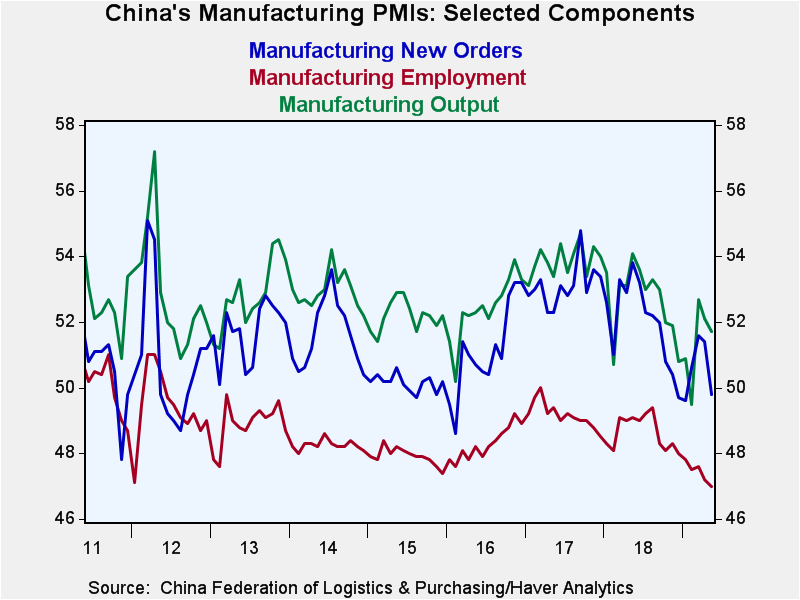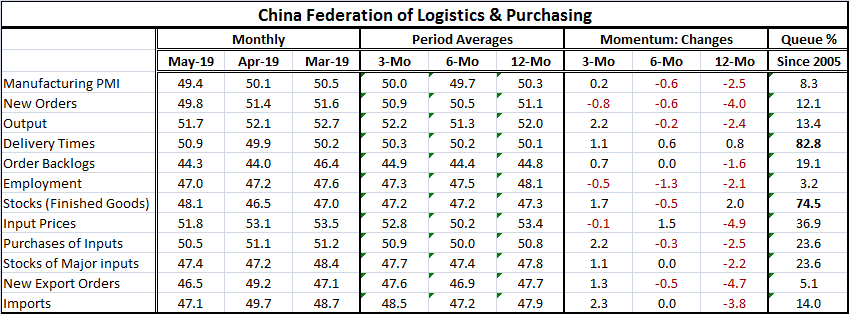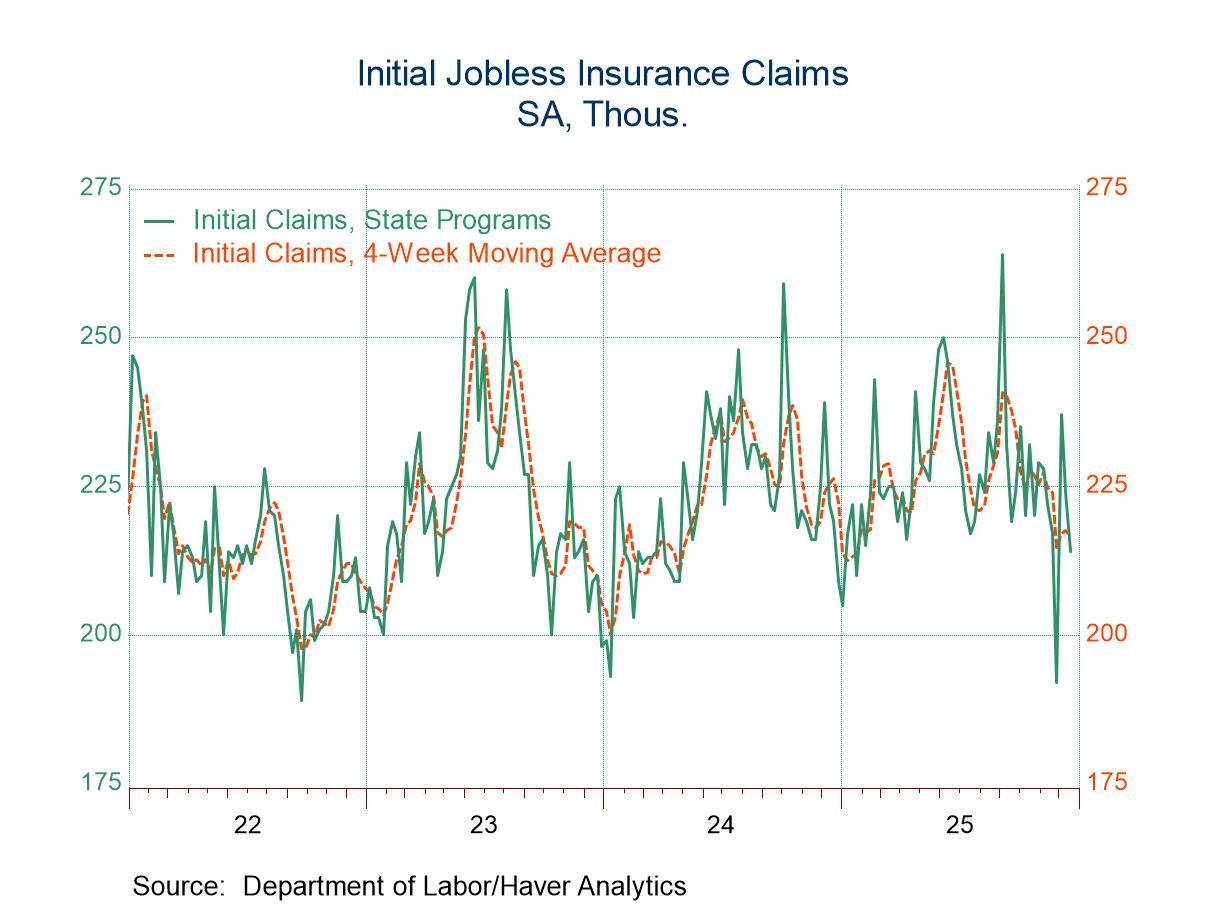 Global| May 31 2019
Global| May 31 2019China's PMI Erodes; The Trade War Escalates
Summary
Globally PMIs are losing momentum. China had been seeing industrial decay early this year then it kicked out of that erosion with a jump in March. But that gain did not hold; the Chinese PMI was slipping again in May and dipping below [...]
 Globally PMIs are losing momentum. China had been seeing industrial decay early this year then it kicked out of that erosion with a jump in March. But that gain did not hold; the Chinese PMI was slipping again in May and dipping below 50, signaling manufacturing sector contraction. The March breakout, led by a surge in orders and output has now proved to be a false signal. The averages for China's manufacturing PMIs over three months, six months and 12 months have been hovering around the 50% mark back to 2011. In 2017 there was a minor revival but that eroded in 2018 and now China's manufacturing sector is quite sluggish again and without momentum, trying to sustain output increases in the face of an escalating trade war with an increasingly negative geopolitical environment.
Globally PMIs are losing momentum. China had been seeing industrial decay early this year then it kicked out of that erosion with a jump in March. But that gain did not hold; the Chinese PMI was slipping again in May and dipping below 50, signaling manufacturing sector contraction. The March breakout, led by a surge in orders and output has now proved to be a false signal. The averages for China's manufacturing PMIs over three months, six months and 12 months have been hovering around the 50% mark back to 2011. In 2017 there was a minor revival but that eroded in 2018 and now China's manufacturing sector is quite sluggish again and without momentum, trying to sustain output increases in the face of an escalating trade war with an increasingly negative geopolitical environment.
Growth = Security
China has long sought growth and strength to be the foundation for political stability. With the tariffs imposed on China, growth is having a hard time making headway. China, that was making some progress on reducing its massive build-up of debt, has since had to reverse that policy to use debt to stimulate the economy. China is feeling the pain and looking to 'return the favor.'

Trade talk break down comes out of the blue..
China and the United States, for years to come, will point fingers at one another over the responsibility for the Trade Talk breakdown. But it is clear that it came when China called a special meeting and thereafter the U.S. found that many conditions important to the U.S. that the U.S. thought had been accepted by China were suddenly viewed as extreme and unacceptable. China has been a rogue in terms of its stand on technology transfer (it steals it) and copyright and trade mark infringement (China does not enforce foreign claims or protect them; China is the epicenter of a global counterfeiting ring of various corporate products featuring handbags, watches and so much more). The U.S. sought not just 'a deal with China' but a specific deal with benchmark numbers and with an underpinning that would make the various agreed elements of the deal identifiable and enforceable. Without enforcement, a deal would mean nothing.
China's view
China's view is that the U.S. asked for too much and infringed on China's sovereignty. Maybe that is true. But there were things China once was agreeing to do. I'm not quite sure how to assess the blame with their backtracking. Nor is it possible to know on what timeline trade negotiations now lay.
The U.S.: The Great Enabler
The U.S.-China situation can be viewed in a paradigm in which the U.S. has been the enabler. For years, China got away with doing things that it should not have been allowed to do. The U.S. ignored it and thereby enabled or even encouraged this activity largely because China was still developing. Suddenly, the U.S. wants China to be well-behaved. But it never made this demand in the past. So China feels it is being dealt with unfairly because the rules have changed. Actually, it is practice and expectations that are changing and now the rules are to be enforced.
Politics of the New Millennial
Negotiations with China now highlight a whole new aspect of international relations. It began in some sense with Russia interfering with U.S. elections. This was not just Russia beating on the U.S. economy or clashing over borders and spheres of influence as in Crimea, Ukraine and Venezuela. Nor was it like supporting a rogue state as in Syria. It was Russia digging at the roots of our democracy. What China did was to build on this idea. Its counter-tariffs (in response to U.S. tariffs imposed on Chinese goods) were set in a way to do maximum political damage to the sitting U.S. President. The tariffs were not aimed at the U.S. economy but at the U.S. President. Recently, Kim Jong-un has revealed that he is following the U.S. primary elections in the U.S. He sent out a message to one-in-twenty-some Democrat candidate, Joe Biden, when Biden said something about Kim that he did not like. U.S. politics are being followed very closely overseas. There is every reason to believe that the motivation for China's backtracking on Trump was its perception that the President was damaged goods politically and would need a trade deal and might settle for much less than what China had put on the table. However, when China pulled those things off the table Trump did not cave in and China seems to have made a political miscalculation that could be costly to both sides.
There is no domestic-international divide anymore on anything
Still, there is a very important message here. As much as Democrats accuse Trump of being divisive, Trump who was not charged in the Mueller report and was cleared of any conspiracy (collusion) with Russia is still being pursued by Democrats over potential obstruction of justice charges on which Mueller was vague. But this is a very technical political situation since there was no crime committed and there was nothing Trump was trying to hide that was embarrassing; he just wanted the investigation stopped because it offended him. What we see is that if Democrats pursue impeachment against Trump we can expect our foreign adversaries to use that to try to weaken the United States.
What's at stake...
We are not talking about unimportant hypothetical possibilities. Kim Jong-un who has still been ranting about the U.S. and the broken down negotiations between the U.S. and North Korea just executed his special envoy to the U.S. and one other member of that delegation for the failure of those talks. In recent weeks, Kim has been blaming the U.S. and Secretary of State Pompeo and National Security advisor John Bolton. Now he kills two members of his own team for their failure and he continues to launch adverse rhetoric at the U.S. for seizing one of North Korea's largest ships that was carrying goods in violation on U.S. sanctions.
Trump: the lightening rod
Trump is a divisive and combative figure. But he has made progress in negotiating deals; albeit some have not closed yet. And if Democrats will not consider a vote on his North America trade pact, it will fail. And if Democrats keep undercutting Trump, he will probably not be able to successfully negotiate with China either. Past presidents – both Republican and Democrat- never had the stomach to do what Trump has been doing and what is now and only now being recognized as critically important and long overdue on the trade front.
Kool Aid- No Mas
Previous to Trump, many were willing to drink the Kool Aid of 'It's free trade.' But 'it' has not been free trade or anything like free trade. Losing jobs and never getting any replacement work or output is not free trade. The exchange rate mechanism that is supposed to drive trade adjustment and turn 'free trade' into a dynamic perpetual motion machine has been coopted. Trump has chosen to use the only weapon he has, tariffs, to try to force change.
Back or forward to the future?
The real question is what will the future look like? Donald Trump may only have the final year and one-half of his administration left. He might get reelected. It is still hard to tell. America is polarized and the difference between Trump or a New Progressive Democrat candidate is like night and day or more like matter vs. anti-matter. Under Trump, the economy has begun to perform better. There are 'jobs for all' but many do not seek jobs and many of the good jobs are simply not on offer. Trade policy is trying to change that. The U.S. has a lot of work to do and what happens will depend a lot on its negotiations with China.
Tariffs the 'Schmoo' weapon (everything weapon).
The President has gone a bit tariff happy threatening tariffs on vehicle imports then setting that aside and now imposing tariffs on Mexico for its role in letting so many immigrants bang on our southern border doors and walls. If the U.S. could handle its own border problem domestically, Trump would not involve Mexico. But Democrats are in some strange denial about the Southern border. By making it a public policy that everyone who whispers the magic word (Asylum!) will be admitted, legions have been attracted to the U.S. Meanwhile, Democrats blame Trump for the border problems and do not give him the financial resources to deal with it. Democrats are trying to force a 'catch and release' program which will simply lead to a new influx of untraceable illegal residents.
Unilateral is multilateral in a one dimension world
Politics is playing out across our border and in our international relations. Many legal scholars are upset by the increasingly unilateral actions of the President, but he is increasing being isolated and given insufficient tools to do his job. There is blame aplenty for both sides and a building sense of crisis. China is being more bellicose. This is the country that grabbed the South China Sea after no provocation and just decided it wanted it. It got no backing for this. The World Court denied China's claim. China still has it. China as a Communist country has great influence on its firms. It's enabling government support that has vaulted Huawei to the forefront in technology. This is another example of how China works. Huawei is trying to fight U.S. allegations of being not trustable. China is warning Canada about the consequence of choosing to side with the U.S. China is preparing a hit list of U.S. firms and people for sanctions (more here).
Beyond trade wars
Prepare not for a trade war but total economic war. We have not seen the worst of it. It has become an ugly world. People liked the U.S. a lot more when it let others take advantage of it and cheat it. Standing up for its rights and for fair play has not been popular globally. I understand there is a strong undercurrent of blaming Trump, but in the end that is not the answer. His aggressiveness has helped to kick this off. But without that confrontation, the U.S. was headed for permanent status as an industrial backwater and U.S. firms were to be milked by China for their trade secrets. Meanwhile, China has spread its influence through a devious 'belt and road' program, something XI says it will now stop abusing. We will see. But as you well know if you do not fight the powers that be (to use Spike Lee's phrase) they will 'be' forever and they will get stronger. Republicans and Democrats would do well sit down and look this increasingly hostile global situation in the eye and find common ground instead of never ending uncommon disagreements.
Robert Brusca
AuthorMore in Author Profile »Robert A. Brusca is Chief Economist of Fact and Opinion Economics, a consulting firm he founded in Manhattan. He has been an economist on Wall Street for over 25 years. He has visited central banking and large institutional clients in over 30 countries in his career as an economist. Mr. Brusca was a Divisional Research Chief at the Federal Reserve Bank of NY (Chief of the International Financial markets Division), a Fed Watcher at Irving Trust and Chief Economist at Nikko Securities International. He is widely quoted and appears in various media. Mr. Brusca holds an MA and Ph.D. in economics from Michigan State University and a BA in Economics from the University of Michigan. His research pursues his strong interests in non aligned policy economics as well as international economics. FAO Economics’ research targets investors to assist them in making better investment decisions in stocks, bonds and in a variety of international assets. The company does not manage money and has no conflicts in giving economic advice.






